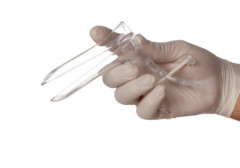
Dubai: Despite the number of breast cancer awareness campaigns that the UAE has seen in recent years, much still needs to be done to encourage women to get regular gynecological tests.
Dr. Muna Tahlak, a consultant obstetrician/gynecologist at Latifa Hospital in Dubai and the president of the Obstetrician/Gynecologist Society in the UAE, said that very few women see their gynecologist just to get a checkup.
Instead, many women wait until they feel a lump in their breasts or experience other symptoms. By then, it may already by too late.
“The culture of preventative medicine is not a strong one [here],” Dr. Tahlak said. “It isn’t embedded in our culture or our education. For a woman to know that she has to go for her yearly exam, this has to start from when she’s in school.”
While pap smears are crucial in catching cervical cancer, another important test is human papillomavirus (HPV) test, Dr. Tahlak said. Ninety-nine per cent of cervical cancers are caused by HPV, and take 10-12 years to develop. “There are pre-cancerous stages,” explained Dr. Tahlak, and much like breast cancer, cervical cancer is treatable if caught early.
Dr. Tahlak also recommended that women get the HPV vaccine, “one of the primary preventions of cervical cancer.” Local guidelines recommend that the vaccine be given to high school-aged girls.
Dr. Tahlak also stressed the importance of getting regular physical exams with a gynecologist, which can catch other major problems.
An example is fibroids, non-cancerous tumors of the uterus, which Dr. Tahlak said is a common complaint among women in the UAE. As the fibroids grow they begin to bleed, and the patient experiences abdominal swelling. At this stage, they must be surgically removed. But, said Dr. Tahlak, a physical exam should catch the condition before the fibroids require surgery.
Once the fibroids are discovered, they can be monitored by the gynecologist. “[We will] periodically have assessments [and] ultrasound just to keep an eye on them and the size,” she said.
Non-cancerous problems can have long-term effects on women – some cause infertility, while one common complaint among UAE women, polycystic ovary disease, can lead to diabetes.












